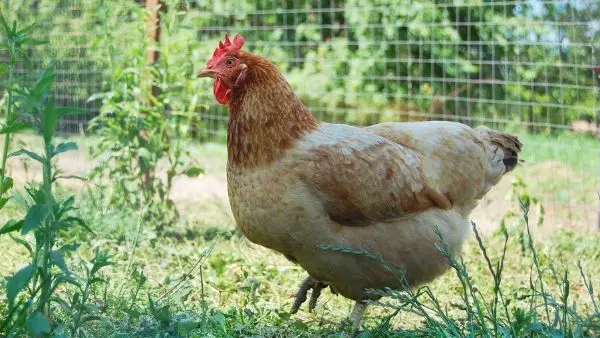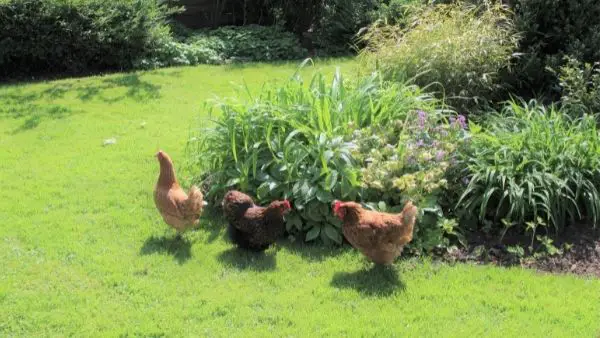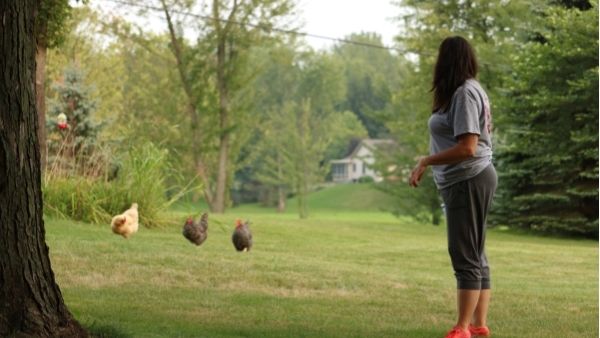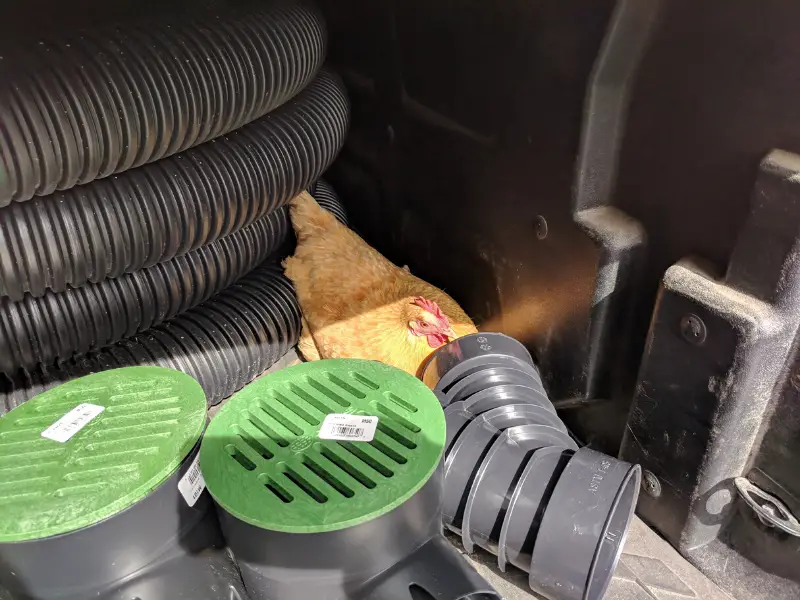Gardening and raising chickens has become a popular trend as people become more concerned about processed foods and sustainable lifestyles. The birds are a complementary hobby, providing fresh eggs, free manure for plants, and entertainment. But, you must consider certain things before releasing chickens in a yard with a garden.
Chickens can destroy a garden by enjoying dirt baths and hunting for bugs and tasty vegetables. The goal is to keep your garden safe while allowing your chickens to roam. It may take more than one technique to successfully keep your chickens out of your garden, such as fencing, building raised beds, natural deterrents, or even building them their own garden and careful monitoring of free-range time. This article will consider the most effective methods and how you can implement them into your homestead plan.
Protect Your Plants
Nibbling on plants and digging around in the dirt for bugs are just a few of the reasons chickens love gardens.
Protecting your plants from wandering claws and hungry beaks is the easiest option for keeping your garden safe. Each method has its advantages and disadvantages. The cost varies depending on the materials required, but the outcome protects your plants while allowing your chickens to roam.
Chicken Wire
Using chicken wire is a surefire way to prevent damage from chickens.
Chicken wire, also known as hexagonal wire, is an ideal solution to protect your garden. Not only can it make an effective fence to keep out some predators, but it can be adapted to individual plants to keep them safe from your chickens. For a more in-depth look at protecting chickens from predators see this article on this site.
The process is quite simple. Take a few stakes or a tomato cage, then wrap them firmly with the chicken wire, which will form a sturdy cage that can keep chickens from reaching the plants within. Unlike just using a tomato cage, the small gaps of chicken wire ensure that chickens cannot get their beaks through.
Chicken wire can also help stop chickens from kicking out dirt from directly around the plant, protecting them in multiple ways to allow for safe growing. The rule of thumb is to ensure total coverage of the plant, but around 12 inches tall should be enough to keep chickens away from the majority of plants.
Chicken Wire Fencing
Chicken wire’s best use when dealing with chickens is on individual plants. The method above makes it difficult for them to dig out dirt and ruin the plants themselves. However, there are other uses for chicken wire as well, including:
- Building a chicken wire fence around the perimeter of a garden plot.
- Adding chicken wire to an existing fence, covering gaps.
- Burying it a few inches into the ground at the bottom of a fence to help prevent digging by chickens or the burrowing of other predators.
One thing to consider with using chicken wire to create a fence is how determined the chickens are. Chickens tend to leap over fences when they do not have enough land of their own to roam around on. Therefore, whether a chicken is content influences how likely they are to jump a fence, even one that is only a foot or so off the ground.
Chicken Wire Cloth
Wire cloth can also be used to cover large portions of the ground. Just cut the cloth to fit the section you want to cover and hold it in place with rocks or bricks. Chickens will not like the feeling of the wire on their feet when they scratch and should leave the area. Even if they do not, it helps prevent them from digging and engaging in dust baths.
A thick wire mesh sheet can also be used as a cover to protect specific areas, as mentioned above. Bend the four corners of the metal sheet to create “legs” and place them over any exposed areas that need protection. The metal sheet’s weight and stability should hold it in place without the need for rocks or bricks.
You can use these sheets to cover areas with freshly spread seed, seedlings, or deep-rooted plants that have not yet broken through the ground. Chicken wire, wire cloth, and metal sheets are available in various sizes, weights, and thicknesses to fit your specific project’s needs. Prices will vary depending on the type of wire.

Plants to Protect with Chicken Wire
What plants are worth the extra attention? Mainly, plants that are susceptible to chickens or dangerous to them, each category deserving the additional protection. Some plants that are susceptible to chickens include:
- Garlic, Corn, and Peas
- Sunflowers
- Beets and Cucumbers
- Melons and Berries
- Leafy Greens
Some garden items can hurt chickens, so they must also be protected to protect the chickens. The dangers range from reflux to toxicity, so it is important to keep chickens away from them. The following plants should be kept from the clutches of chickens:
- Daffodils and Tulips
- Hydrangea
- Rhododendron
- Nightshades (tomatoes, eggplants, potatoes)
- Avocados and Onions (affects the taste of eggs)
Gardens with Multiple Runs
As mentioned above, chicken wire is a great tool to section off parts of the yard or garden, allowing you to build a quick fence. One of the most effective ways to utilize chicken wire and protect your garden from chickens is using multiple runs. A run is just a section, so multiple runs simply mean a garden with multiple sections.
A multiple run garden typically has a series of fences and gates that close off access to specific areas while allowing the chickens to explore others. Remember, a chicken satisfied with its roaming area is less likely to jump a fence, no matter the size.
With multiple runs, they can dig, root, and fertilize one area of the garden, potentially ignoring others. This method works best for gardens that are close to coops. While using multiple sections is more complicated and presents a few convenience problems, it is an effective method for managing a flock.
There is also a simpler variation of a run called a chicken tractor. It is a movable cage that is large enough to house multiple chickens. It can be placed over a specific part of a garden, keeping chickens away from certain plants. Youtuber HAXMAN will teach you how to make your own in his Making a Chicken Tractor tutorial.
Potted Plants
However, there are other useful methods to protect a garden without utilizing chicken wire, such as potting plants or planting them in a raised bed. Potting is an easy way to keep vulnerable plants away from chickens and can also be helpful for plants that need special soil or conditions.
While chickens can still climb into pots and destroy the soil around a plant, by utilizing pots, you are making them much less attractive options. After all, chickens cannot use the limited soil for a dust bath or find much food there. Additionally, you can use chicken wire on individual plants in pots for extra protection.
Raised Beds
Raised beds are another great alternative for vulnerable plants. Unlike potted plants, they are not portable. However, raising a bed more than three feet keeps it out of the eyesight of chickens. They can dig and enjoy dirt baths on the ground while plants grow in the beds above.
Of course, chickens can jump, but as mentioned previously, they usually only do this when they are unsatisfied with their conditions.
Raised beds are not recommended for plants that need deep soil, but they are an option for many herbs and most vegetation with shallow roots.

Rocks
Using rocks from your yard is a cheap and easy way to protect gardens. Simply place rocks around the base of plants to stop chickens from digging and taking dirt baths. Some of the ways this method can be used are:
- Placed in an area around a garden to dissuade chickens from entering.
- Placed around plants in a garden.
- Placed in a pot or raised bed to provide protection.
Know that this method uses decent sized stones, big enough that they cannot be easily dislodged and kicked away by chickens. Also, while this method does not harm plants, you must be careful not to place stones directly on top of a seedling, or it will not be able to grow properly.
Keep in mind that this does nothing to prevent chickens from eating the plants, and they can still walk over the stones. However, them kicking away soil and taking dirt baths can be far more harmful to plants, even those they do not eat.
Weeds
It might sound strange to think of weeds when talking about gardening, especially when weeds can be destructive, and chickens might try to make a snack out of their brightly-colored flowers. However, the pros might outweigh the cons since chickens are always on the lookout for open patches of dirt, and weeds can fill in those spots.
The less open space in your garden, the less likely you are to find chickens taking dirt baths or rooting around for bugs. Keeping some non-invasive weeds in a garden will deter chickens from digging and rooting. Additionally, most common weeds should not hurt hearty plants if managed properly.
Using weeds will not cost anything on the front end, but weeds can damage plants, causing you to lose vegetation throughout the gardening season.
Drive the Chickens Away
Some plants and scents will drive chickens away from your garden. Using plants and scents can be an easy natural defense that can even benefit you beyond being a chicken deflector.
A few ways to deflect chickens in a natural way is using herbs and spices. Citrus also works wonders, managing to repel chickens without the need for much effort or equipment.
Herbs and Spices
Some herbs naturally deter chickens from gardens. Planting these around the edge of your garden or between plants to avoid open patches of dirt will help to keep your chickens away. Some herbs to consider are:
- Oregano
- Marjoram
- Chamomile
- Mint
- Thyme
Another popular deterrent is strong-smelling spices. Chickens tend to avoid areas because of the smell and the tingly sensation that spices cause in their feet. This feeling will not hurt the chickens, but it will deter them away from the area.
Chickens may peck at some of these spices when looking for food, but the taste will drive them away from the garden as well. Try these spices in your garden:
- Curry Powder
- Paprika
- Cayenne Pepper
- Garlic
- Cinnamon
Citrus
Similar to spices and herbs, chickens do not like the bitter taste or smell of citrus. Some gardeners claim that the smell of lemon juice alone will deter birds and suggest spraying it or essential oils around your plants frequently. Check the ingredients in oils and juices before spraying them, as some ingredients may be harmful to chickens and plants.
You can also put citrus peels in your garden. Scatter them in the open patches and spread them around the outer edge of the garden. All citrus peels work, so you can use peels from oranges, lemons, limes, or grapefruits.
Distract The Chickens
Chickens are looking for open spaces to dig and root around, so setting up an area just for your chickens is a great way to divert their attention and preserve your garden. This works hand in hand with the multiple runs mentioned earlier.
Additionally, keeping plants out of a chicken’s line-of-sight can be helpful in this process. Chickens will explore the area around them without disturbing the vegetation you want to preserve if you do this.
Out-of-Sight Garden
Planting a garden away from chickens is an easy way to avoid destructive behavior. Consider these options for out-of-sight gardening:
- Plant a garden in the front yard and keep the chickens in the back
- Plant a row of trees or bushes between the chicken coop and garden
- Place the garden on the other side of the yard (as far away as possible)
Chickens will enjoy the open space around them and will be less likely to bother the vegetation in your garden.
Chicken Garden
Try building a chicken garden if you have extra space.
Chickens may find their playground more exciting and choose to enjoy it instead of your garden. A piece of land dedicated to the birds provides plenty of space for dust baths, rooting, and digging. It can even be filled with some special plants just for them.
Till up a section of ground, plant some leftover vegetables, and let the flock enjoy their own space. This method is especially beneficial because it provides free food for the chickens, and their manure can be sourced for your main garden.
Keep in mind that this also helps keep chickens from wanting to jump over fences.
Decrease Flock Size
The larger a flock, the more damage in your garden and yard.
Consider your space when planning to garden with chickens. More than five chickens will overwhelm a small yard, with no more than three chickens being recommended for an urban flock. You could have 10 to 15 in a big yard or on a farm, but remember that chickens are animals and require proper care, even if you have a large enough space.
Additionally, keeping a controlled flock size keeps chickens from feeling cramped and wanting to flee, subsequently invading your garden.
Free Range Part-Time
Allowing chickens to roam is part of the free-range lifestyle, but scaling down their time in the open has benefits.
You are already planning to spend time working on your garden, so let your chickens roam while you are outside. This allows you to supervise their activities and shoo them away from your vegetables. Evening time often works best since they will be ready to roost in their coop once the sun sets.
There are several perks to this method:
- It keeps the chickens out of your garden when you cannot monitor their activities.
- It prevents chickens from wandering into a dangerous area or finding ways to get out of your yard.
- Chickens are safe from predators in their coop.
You might prefer to turn your chickens loose and just let them roam. However, supervised free range time helps to protect your garden and birds.

Drawbacks of Gardening with Chickens
Both serious gardeners and hobbyists may find themselves frustrated by some of the negative traits of chickens, which include:
- Soil Destruction: Chickens like to dig, scratch, and take dirt baths in exposed dirt, which quickly creates large exposed patches of ground.
- Predator Attraction: A flock attracts predators that may also destroy a garden. Foxes, snakes, and bobcats can dig through a garden, stalking and chasing prey. They may also damage fences, flower beds, coops, and water features in gardens.
- Unwanted Waste: Excessive droppings may become frustrating, and the high nitrogen content can be damaging to some foliage.
- Plant Damage: Chickens can cause extensive damage to yards and plants. Digging through the grass and pecking at buds and leaves will leave flower beds and sod in shambles.
Benefits of Gardening with Chickens
There are also some major benefits to having chickens, such as:
- Pest Control: Chickens can pay for themselves in bug control. They love to eat bugs, and they make quite effective defenders for your garden.
- Free Fertilizer: Chickens will naturally fertilize your garden or yard. Bird waste can be extremely helpful in the nutrient-depleted soil of older gardens. Using bird waste as fertilizer is most successful several weeks before planting to avoid damaging plants with the high levels of nitrogen in chicken waste.
- Composting: Give your chickens access to your composting pile, and they will aerate it for you. Also, bird waste is filled with the oxygen and nitrogen needed for decomposition.
- Tilling and Mulching: Chickens can earn their keep tearing up soil and spreading mulch. They can kill a plot of soil they scratch and dig through the dirt, but they are great at spreading mulch for the same reason.
Conclusion
There are many ways to keep chickens out of gardens. Explore the options to see what meets your personal needs and budget. Feel free to be creative or try out several methods to find what works best for you.



